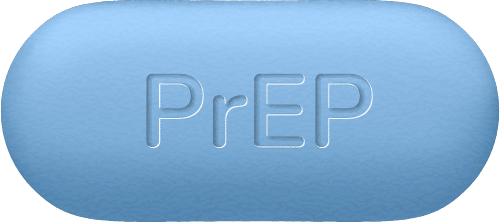
One Pill a day can prevent HIV transmission.
You can get started with PrEP without leaving your home. Fill out the form below to schedule your free and confidential PrEP consultation with Matthew 25 in Evansville.

What are the next steps?

Talk about the options
We will talk with you about the different forms of prevention.

One on one sessions
Your appointment will be private and confidential.

Answer your questions
We will answer all of your questions about HIV & PrEP.

Do it all from home
You can complete the entire process on a smartphone.
What is PrEP?
PrEP (pre-exposure prophylaxis) is medicine people at risk for HIV take to prevent getting HIV from sex or injection drug use. When taken as prescribed, PrEP is highly effective for preventing HIV.
PrEP may be right for you if you test negative for HIV, and any of the following apply to you:
You have had anal or vaginal sex in the past 6 months and you
- have a sexual partner with HIV (especially if the partner has an unknown or detectable viral load),
- have not consistently used a condom, or
- have been diagnosed with an STD in the past 6 months.
You inject drugs and you
- have an injection partner with HIV, or
- share needles, syringes, or other equipment to inject drugs (for example, cookers).
You have been prescribed PEP (post-exposure prophylaxis) and you
- report continued risk behavior, or
- have used multiple courses of PEP.

Frequently Asked Questions
- PrEP is safe but some people experience side effects like diarrhea, nausea, headache, fatigue, and stomach pain. These side effects usually go away over time.
- Tell your health care provider about any side effects that are severe or do not go away.
- Learn more about side effects from the Truvada®external icon and Descovy®external icon.
If you are a woman and have a partner with HIV and are considering getting pregnant, talk to your doctor about PrEP if you’re not already taking it. PrEP may be an option to help protect you and your baby from getting HIV while you try to get pregnant, during pregnancy, or while breastfeeding.
PrEP is highly effective for preventing HIV.
- PrEP reduces the risk of getting HIV from sex by about 99% when taken as prescribed.
- Although there is less information about how effective PrEP is among people who inject drugs, we do know that PrEP reduces the risk of getting HIV by at least 74% when taken as prescribed.
- PrEP is much less effective when it is not taken as prescribed.
- PrEP reaches maximum protection from HIV for receptive anal sex (bottoming) at about 7 days of daily use.
- For receptive vaginal sex and injection drug use, PrEP reaches maximum protection at about 21 days of daily use.
- No data are available for insertive anal sex (topping) or insertive vaginal sex.
Learn more about the PrEP effectiveness estimate.
Yes. With telemedicine (phone or video consultation with a health care provider) and mail-in self-testing, it is possible to order a specimen collection kit which contains the supplies to do all the testing required to start or continue taking PrEP, even if an in-person appointment is not possible.
There are several reasons why people stop taking PrEP:
- Your risk of getting HIV becomes low because of changes in your life.
- You don’t want to take a pill as prescribed or often forget to take your pills.
- You have side effects from the medicine that are interfering with your life.
- Blood tests show that your body is reacting to PrEP in unsafe ways.
Talk to your health care provider about other HIV prevention methods that may work better for you.
Tell your health care provider that you would like to start taking PrEP again. You will need to take an HIV test before you start PrEP to make sure you don’t have HIV.
- PrEP is for people who are at ongoing risk for HIV.
- PrEP is not the right choice for people who may have been exposed to HIV in the last 72 hours.
- If you may have been exposed to HIV in the last 72 hours, talk to your health care provider, an emergency room doctor, or an urgent care provider about PEP (post-exposure prophylaxis).
